
The Big Data Professional Consulting course develops proficiency across a range of key Big Data topics, providing a skill-set that enables a member of a Big Data solutions team to perform in a variety of capacities. The course offers comprehensive coverage of Big Data analysis and analytics, including data mining, statistical techniques, visualization and prediction, as well as Big Data engineering topics such as Hadoop, MapReduce, NoSQL, data processing and storage.
Complete the Big Data Professional Consulting course and, optionally, get accredited as a Certified Big Data Consultant by passing the certification exam. You can purchase the course now and get the exam later, or you can get them together at a discount as part of the Certification Bundle.
Upon completing the course you will receive a digital certificate of completion, as well as a digital training badge from Acclaim/Credly. Because this course encompasses both the Big Data Professional and Big Data Consultant certifications, upon passing the exam you will also receive official Big Data Professional and Big Data Consultant digital accreditation certificates and certification badges from Acclaim/Credly, along with an account that can be used to verify your certification status.
If you already completed the Big Data Professional course modules, you can purchase a partial course (or a partial bundle) with only the modules specific to the Big Data Consultant track here.
Choose the Certification Bundle to receive the entire course together with the online-proctored certification exam and a set of practice exam questions, all at a bundle discount.
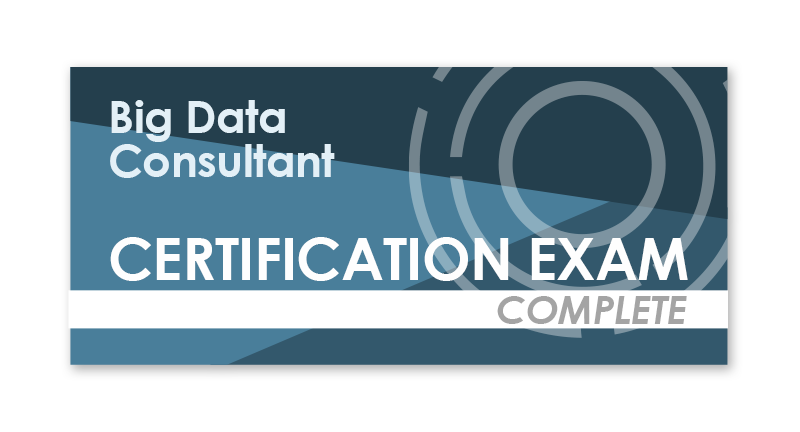
Exam Details

Exam Details
Upon purchasing this course, you will automatically receive access via the Online Interactive eLearning platform. To provide you with the greatest flexibility, you will also have the option to access the course materials via two additional eLearning formats, at no extra cost. All three eLearning formats are briefly described below. A more detailed comparison can be found here.
- For everyday learning: An online interactive eLearning platform with individual lessons, as well as interactive and automatically graded exercises and practice questions.
- For learning on-the-go: A study kit platform with access to full course documents that support online/offline synching, annotations, comments, custom bookmarks and cross-document searches.
- For your reference: A set of printable watermarked PDF documents that you can keep (for all course workbooks and posters).
All three forms of access are subject to Arcitura’s *.
Upon purchase, access to the online interactive eLearning platform (1) is provided within one business day. Access to the study kits (2) and the PDF documents (3) is provided upon request.
The course is comprised of a set of modules. Each module has a set of lessons and is further supplemented with exercises to help reinforce your understanding of key topics. Shown below are the digital contents and the topic outline for each course module:
Module 1: Fundamental Big Data Science & Analytics
This foundational course module provides a high-level overview of essential Big Data topic areas. A basic understanding of Big Data from business and technology perspectives is provided, along with an overview of common benefits, challenges, and adoption issues. The module content is divided into a series of modular sections, each of which is accompanied by one or more hands-on exercises.
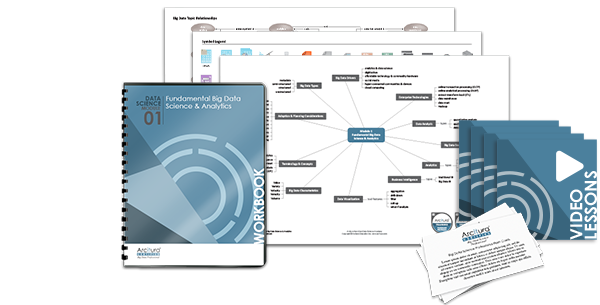
Course Module Contents
Topics Covered
Module 2: Big Data Analysis & Technology Concepts
This course module explores a range of the most relevant topics that pertain to contemporary analysis practices, technologies and tools for Big Data environments. The module content intentionally keeps coverage at a conceptual level, focusing on topics that enable participants to develop a comprehensive understanding of the common analysis functions and features offered by Big Data solutions, as well as a high-level understanding of the back-end components that enable these functions.
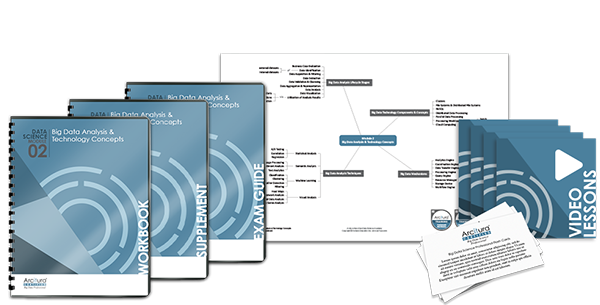
Course Module Contents
Topics Covered
Module 3: Big Data Analysis & Technology Lab
This course module presents participants with a series of exercises and problems that are designed to test their ability to apply their knowledge of topics covered in previous modules. Completing this lab will help highlight areas that require further attention and will help prove proficiency in big data analysis and technology and practices as they are applied and combined to solve real-world problems.
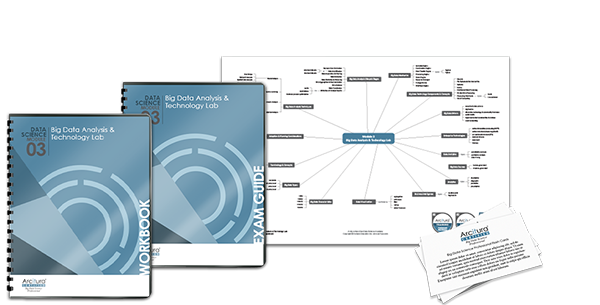
Course Module Contents
Topics Covered
Module 4: Big Data Analysis & Science
This course module provides an in-depth overview of essential topic areas pertaining to data science and analysis techniques relevant and unique to big data with an emphasis on how analysis and analytics need to be carried out individually and collectively in support of the distinct characteristics, requirements and challenges associated with big data datasets.

Course Module Contents
Topics Covered
Module 11: Fundamental Big Data Engineering
This course module covers engineering-related concepts, techniques and technologies for the processing and storage of big data datasets. It highlights the unique challenges faced when processing and storing large, volatile and disparate sets of data. NoSQL is covered and the MapReduce data processing engine is explained in detail as a base framework for high-volume batch data processing.
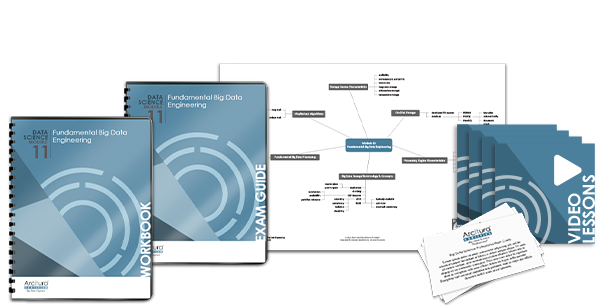
Course Module Contents
Topics Covered

Learn About Arcitura: Take the Video Tour
Watch these helpful informational videos to learn about Arcitura programs, courses and certifications.
About Arcitura
About Arcitura Courses
About Arcitura Certifications
What’s in an Arcitura Course
Comprehensive
Coverage
Each course provides a comprehensive curriculum with 2-3 modules and 20-40 hours of training.
More Than Just
Video Lessons
In addition to standard video lessons, courses include full-color workbooks and reference posters for all
lessons.
Interactive & Graded
Challenges
Courses also include interactive and graded exercises, interactive and graded self-tests and other
supplements.

The Arcitura Difference

EACH COURSE
- is authored by a dedicated courseware development team
- has a self-test, accreditation exam and professional certification
- is available via two different eLearning platforms
ALL COURSES
- undergo a common development process
- are authored to be consistent in quality, structure and style
- share a common vocabulary and symbol notation
- are authored in collaboration with subject matter experts
Take Your Skills Anywhere
Because both courses and accreditations are vendor-neutral, they empower you with skills and credentials that you can take to wherever you need to go.

Lifetime Access Guarantee
Access to the eLearning platforms is dependent on third-party platform providers. As a result, Arcitura cannot make any guarantees or warranties regarding the behavior or availability of the platforms, nor can Arcitura guarantee a specific duration for which these platforms will remain available. When your course is set up on an eLearning platform, your access will have no expiration date and will be provided indefinitely. The PDF documents that can be made available for you to download are yours to keep forever.





